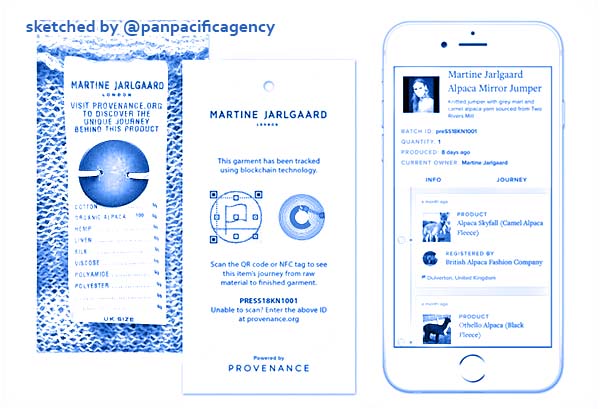[Analytics] How blockchain is transforming the fashion industry

Through the scanned QR code or NFC tag using blockchain technology, consumers are able to recognize the apparel manufacturing process ― from the raw materials to the finished product. Courtesy of A Transparent Company. Sketched by the Pan Pacific Agency.
After a rise in brand transparency among apparel brands, e-commerce based Everlane started sharing the manufacturing price process and supply chain information with consumers. Victoria Kim specially for The Korea Times.
For example, it reveals factory locations, the number of employees and the establishment year, among other things. The radical transparency strategy has made this retailer popular and revolutionized how customers are educated on fashion products. Now we need to realize the true cost of the products ― from raw materials to the store ― especially when it comes to the high-end fashion category.
Until now, the luxury industry has been the last to embrace innovative technology platforms, from e-commerce to social media. But with blockchain technology, the industry is at the forefront of accepting this innovative platform.
Luxury goods conglomerate LVMH is developing a system that uses blockchain technology to authenticate merchandise amid growing concerns about the proliferation of counterfeit items. Richemont and Kering also are preparing a similar system.
So why are these rivals on the same track with identical technology? It has taken a long time to build safeguards to protect the authenticity of high-end fashion goods in a market flooded with fakes. A warranty system and a series of numerical codes failed to block knock-off products ― that is why they are turning to blockchain.
Blockchain refers to a data distribution processing technique in which all users participating in the network distribute and manage the data. The most prominent example of the technology’s use is the virtual currency Bitcoin. This and other crypto currencies are a kind of trading account that can store and confirm transaction records.
Blockchain ensures the accuracy and reliability of the data based on data distribution processing technology, enabling consumers to verify directly the product’s authenticity, including the materials used, through a certification number of the place of manufacture. Consumers who value corporate social responsibility also can track a product’s materials by the digital signature to make sure the brand used eco-friendly materials or sourced them through certified ethical manufacturers.
De Beers, the world’s biggest diamond producer by gem value, developed the blockchain platform Tracr that will be introduced by next year. This will allow retailers to verify the authenticity of diamonds through the value chain and ensure they are not from regions of conflict.
Blockchain’s real-time access to updated product information from brands will enable retailers to check stock status and customer feedback. Eventually, blockchain-based platforms will allow broader and more transparent communication between producers, brands and consumers, reducing deals with middlemen.
Blockchain will have a big impact on the fashion industry, but significant investment is needed to build the systems to support it. Through its development, the fashion industry will be able to secure a wider supply chain and have more control of the various stages through to the consumer. But the consumer response to such a system is still unknown.
People are adapting quickly to new technologies, but there are concerns over the exposure of personal data and the use of that data for marketing. Therefore, safer technology platforms will have to be created and consumers provided with a comprehensive understanding of how blockchain technology works.
Victoria Kim is the adjunct professor in the Department of Fashion Business Management at the Fashion Institute of Technology (F.I.T), SUNY Korea. She has over 10 years’ experience in fashion consultancy and how fashion brands intersect with global retail trends and innovation. Her research interests are fashion retail trends and global business management based on contemporary consumer lifestyle change.